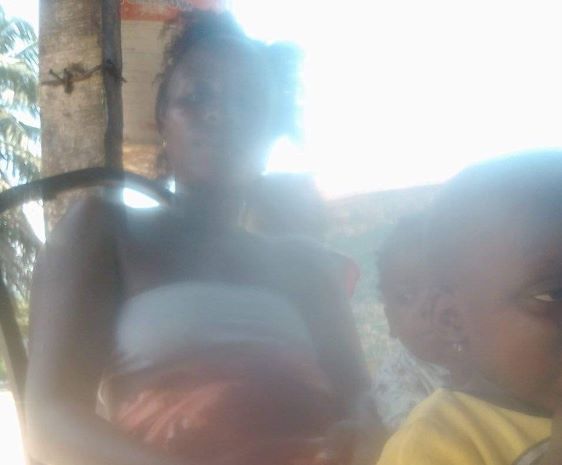PHOTO: Hannah narrates her horrible experience
By Garmah Never Lomo, garmahlomo@gmail.com
Hannah Smith, 38, has no alternative but to watch her husband take another wife who now has few children for the man.
The polygamist lives with his wives in the rural village of Limeo, District # 3 Liberia’s southern Grand Bassa County. They live on farming as a source of livelihood.
As Hannah explains, her husband did not, from start, wish for a second wife but reality pressed on him that his beautiful wife, Hannah, couldn’t bring forth a child. “He was forced to find another woman to bear children for him,” Hannah divulged.
Infertility goes beyond privacy in rural communities like the village in which Hannah lives. A chief of Hannah’s village has told this Reporter, “once the girl is married to a man, her immediate responsibility is to bring forth a child or children for the husband. If she delays for a year or more, she may be branded as barren or unfruitful. The immediate families on both sides, husband and wife, may begin intruding in the couple’s affairs. “Children are everyone’s business”, the chief said. That gives ground for everyone to be concerned about childbearing.”
The strange myth is, only women have all the faults that may cause infertility. The traditionalists hold this belief, which largely stigmatizes women once there is a sign of infertility, even if not proven in a hospital.
Hannah says one of the horrible experiences she has in her nightmare is, all the time, her husband would address her childlessness publicly, even if there was a dispute that did not relate to childbearing.
For the hope of ending infertility, Hannah has disclosed that she ended up to herbalists after giving up on prescribed western medication. “Country Doctors (herbalists) say it was witch but I found no answer from every side,” now appears to be accepting her condition.
“Only God can change my Condition,” she says, suggesting that human’s intervention will not materialize in her case. Therefore, this young woman has adjusted to raising other people’s children—the hard reality of coping with infertility.
Infertility stigma in Liberia
A women defender, advocate and the Executive Director of the National Institute for Public Opinion (NIPO), Roseline Thomas Richards has been giving her input on infertility stigma in Liberia.

Mrs. Roseline Thomas Richards
She defines infertility as the inability of a couple to get pregnant (conceive) despite having regular unprotected sex. Some other definition might put it as a condition in which a woman cannot get pregnant after one year of trying to conceive. Or in case of male infertility, a man is incapable of impregnating a woman.
According to Mrs. Richards, in women, the cause of infertility can include endometriosis, uterine fibroids and thyroid disease. Men with fertility problems may have a low sperm count or low testosterone.
Lack of statistics on the condition
It is revealed by Mrs. Richards that currently, Liberia does not have any statistics on infertility despite victims exist and that the risk of infertility increases as you age.
Infertility affects men and women equally. while infertility is not a disease, and its treatment can affect all aspects of people’s lives, which can cause various psychological-emotional disorders or consequences including turmoil, frustration, depression, anxiety, hopelessness, guilt, and feelings of worthlessness in life.
The NIPO Executive Director in an awareness engagement disclosed that Infertility stigma is a phenomenon associated with various psychological and social tensions especially for women. The stigma is associated with a feeling of shame and secrecy.
“Due to the Man’s World that we live in or Patriarchy (Man’s dominance over women in terms of authority) women will always be blame due to cultural and social norms and some religious beliefs. The ideal of blaming women for infertility is based on perceptions and not facts” she narrated.”
Narrating further, Mrs. Richards said infertile women face social and self-stigma, which threatens their psychosocial wellbeing and self-esteem. They use defensive response mechanisms and social support to mitigate these effects.
Education focused on coping strategies might be helpful against infertility stigma, it is advised.
Even if a woman is infertile, she’s a victim and must not be stigmatized. She needs support for the family and people around her. (Full text of the interview with Mrs. Richards is at the close of this report)
Collective fight to end infertility stigma
Communities can take advantage of the existing capacity and resources and also partner with organizations: like CBSs, NGOs, and those driving the fight say even Faith-based organizations to support their effort to break the stigma.
For his part, Dr. Trokon Washington, County Health Officer of RiverGee County has recommended to Merck Foundation through the office of Liberia’s First Lady, Clar Marie Weah to empower civil society organizations, the media and local women groups in their local communities, in order to have a very huge publicity on the issue of infertility stigma.

Dr. Trokon Washington
Dr. Washington says when this is done, local community dwellers will be educated and themselves with carry the massage to others not to stigma childless women or men.
According to him, not only empowering local CSO, media groups or women group on the issue, those who are faced with infertility issues, should also be empowered.
He says with the type of society we found ourselves living in, whether people are educated to the issue, they will stigmatize those who are facing the problem rather than helping them to find solutions. “Therefore, the best way to solve such problem, those who facing the problem the should be removed from their current communities to another and empower them if their conditions can’t medically be resolved.”
Meanwhile, Dr. Washington has urged community dwellers to stop stigmatizing infertile women and men because it is not a condition those chose to live with.
But he is calling on them to help people in such conditions by taking them to the hospital instead of mocking them. If you can’t help don’t harm he said.
Since Merck Foundation has trained fertility specialists, the government should see reason by creating fertility centers well-equipped to cater to infertility patients he added.
BELOW TRANSCRIPT OF INTERVIEW WITH NIPO EXECUTIVE DIRECTOR, MRS. ROSELINE THOMAS RIGHARDS:

Mrs. Richards
Q: www.newspublictrust.com: What role can rural women contribute to the campaign against infertility stigma?
A: Mrs. Richards: Rural women can mobilize men to join them play a crucial role by providing education through awareness on the effect of infertility stigma and the critical part of normalizing conversation about fertility problems because infertility awareness can remove stigmas and barriers. That’s the first step in erasing stigma. Increasing awareness will also increase empathy and sympathy towards those dealing with such a personal problem. Opening up honest yet sensitive conversations will benefit everyone. Also rural women can organize psychosocial support for survivors and even those who continue to suffer still.
Q: www.newspublictrust.com: Should infertility be given attention considering the harm done to women?
A: Mrs. Richards: Infertility should be given attention considering the infertility stigma being a phenomenon associated with various psychological and social tensions especially for women. The stigma is associated with a feeling of shame and secrecy. This cause women not to achieve their full potential and their unwellness. It is important to address. It should be given attention because, not everyone knows what really is it. It is more common than people think. Some people think that infertility is a female thing but it is not. Anyone can face challenges when starting a family. Based on these, infertility awareness can help remove stigmas and barriers.
Q: www.newspublictrust.com: What are some factors undermining the fight against infertility?
A: Mrs. Richards: The barriers include culture, social norms, religious beliefs, illiteracy, poverty, limited method choice, financial costs, the status of women, medical and legal restrictions, provider bias, and misinformation. The presence or absence of barriers to fertility regulation is likely an important determinant of the pace of fertility.
Q: www.newspublictrust.com: What are the best idea you think can be put in place to stop stigma against infertility survivors as well as those suffering from it?
A: Mrs. Richards: The idea around stopping the stigma against infertility, is a collective effort of everyone both men and women to prioritize the spreading (awareness) of the understanding/ education or knowledge of infertility, what it is and how the stigma can affect everyone. Because awareness can help remove stigma and barriers.
Q: www.newspublictrust.com: How can communities get involved in spreading the message about infertility?
A: Mrs. Richards: Community can get more men trained to champions the awareness to work with other women to break the stigma and barriers on infertility.

